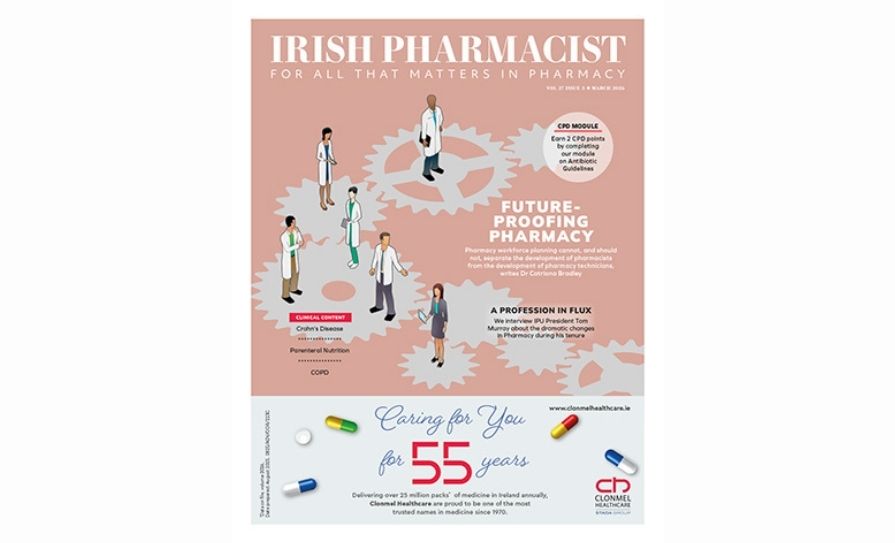There’s no quick fix to codeine addiction and pharmacy-hopping behaviours but the phenomenon does require solutions and creative thinking, writes Fintan Moore.
The recent Prime Time episode broadcast on RTÉ dealing with the topic of codeine overuse made for uncomfortable viewing at times from a pharmacist point of view. As professional healthcare providers, we don’t want to end up in the situation where we are facilitating the supply of codeine-containing products to people with an addiction problem, but the current guidelines are not a serious barrier to such people if they’re willing and able to travel to multiple pharmacies. For instance, the lady who was interviewed for the programme who used to bring period products to the counter when buying codeine products had worked out a solid strategy. As long as she didn’t hit the same pharmacy too often in a short space of time, then she could plausibly answer all relevant questions, and the sale would seem like a reasonable course of action.
Trying to help people who are dependent on codeine to the extent that they’re touring pharmacies is no mean feat
Trying to help people who are dependent on codeine to the extent that they’re touring pharmacies is no mean feat, and anybody purporting to have easy answers probably doesn’t fully understand the problem. If all the relevant OTC products were made prescription-only, that would be fine by me in terms of providing clarity. Instead of going through the current charade and trying to guess if the person has a dependency problem, the most important question would be, ‘Do you have a prescription?’ However, the person will simply find a GP willing to write a prescription for 180 (or 240) tablets a month and continue to use them excessively. Any shortfall in availability between prescriptions will end up being sourced illegally. In the absence of adequate addiction counselling, nothing will really change. The sad reality is that many of the people heavily dependent on codeine are a lost cause. However, there is a tier of people who stay at the limit of six-to-eight tablets a day, but use them every single day; and a prescription requirement would at least compel them to discuss the issue with a doctor. Of course, another sad reality is that GPs are already swamped, so there’s no guarantee that they’ll have the time to help the situation, but there’s at least some hope.
The main benefit of a prescription-only requirement would be to create a barrier to codeine use that would hopefully cut down on the number of people who end up with a dependency. A similar result could be possible using a ‘codeine register’ linked to a central database of people purchasing codeine-containing products. Granted, pharmacists need yet another scheme like we need a hole in the head, but the sensible thing to do would be to slap an extra couple of euro onto each sale to fund the workload. The extra cost would act as a further deterrent and nudge people to safer alternatives. There’s no perfect solution to the problem, but I’m open to any practical suggestions.
UNHOLY ORDERS
I know it’s not perfect, and that it’s not proper e-prescribing, but I’m generally a fan of Healthmail. Used properly by doctors, it can improve their ability to provide care to their patients, with reduced travel, less crowded waiting rooms, and a convenient communication channel between pharmacist and prescriber. However, despite over two years of getting to grips with it, I still haven’t fully worked out the best way to decipher what a person at the counter means when they say they’re in to ‘pick up a prescription that was ordered for Joe Bloggs’. In the early days, this phrase would automatically lead to a rummage through all the bags of prepared prescriptions looking for the one for Joe Bloggs. When that failed, I’d go the computer to see if that could shed some light. Then, with nothing becoming any clearer, I’d ask the patient when they had ordered the prescription, to be told ‘I rang the doctor and he said he’d send it over’. Lightbulb moment, and a clarifying question, ‘so you’ve just ordered it from the doctor, but you haven’t asked for it to be made up?’ Pause while they digest the question and reply, ‘that’s right’. As time went by, I started getting much quicker to introduce that question, and it’s saved a lot of time.
MISSING IN ACTION
The other Healthmail issue, and the single greatest time-waster, is the failure of GPs to send prescriptions when they’re supposed to, leading to the sequence of:
‘I’m in to pick up the prescription for Jane Doe. The doctor sent it over.’
Check healthmails – no prescription. Tell patient.
‘I was talking to him this morning. He said he was doing it right away.’
Check again. Definitely nothing. Tell patient.
‘They charged me €30. I‘ve got the receipt on my phone.’
Tell them again that it hasn’t arrived.
‘It should be here. Can you ring them?’
Tell them we’ve the same phone number that they have, so we will not ring because we won’t get through any faster than they can.
Eventually the patient leaves, but calls back, or phones us every hour until the prescription arrives or we close for the day. Rinse and repeat.







